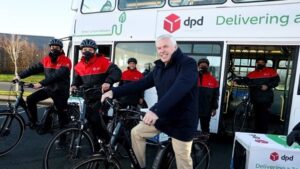Implications for Logistics and Commuting
In a massive step towards positive climate action in Ireland, President Higgins has signed the climate action Bill into Law.
The process for setting sectoral targets starts now.
The magnitude of the cuts required are absolutely huge, and as the recent succession of wildfires, heatwaves, and catastrophic flooding has shown us, necessary.
Setting targets is the easy part, finding measures to meet those reductions is difficult.
The real work starts now.
The magnitude of the cuts required cannot be overstated. EPA figures for 2019 show that if we left transport and agriculture and completely eliminated every other greenhouse gas emission, even then we would fail to meet the 50% reduction target.
Given that we will still want to heat our homes and have lighting at night, transport and agriculture must play their part. In fact, transport may have to contribute more than its proportional share given that some emissions in other sectors are not possible to eliminate.
For example, the production of cement (which is increasing globally) cannot be decarbonised completely. Cement is made through “calcination” by heating limestone (CaCO3) until it splits off some carbon dioxide (CO2) to make lime (CaO). Even if we used a renewable source of heat to heat the limestone, these emissions from the calcination chemical reaction still produce about half the emissions associated with cement production.
Implications for Road Transport (Logistics and Commuting)
Source epa.ie
Transport makes up more than a fifth of Irelands Greenhouse gas emissions. From 1990 to 2019, road transport emissions went up by 142.6%. Transport emissions peaked in 2007 due to the economic crash but transport emissions have increased in n5 of the 7 years from 2003-2019.
Emissions from private car and logistics journeys will have to reduce hugely in the next 9 years to halve emissions by 2030 and reduce further in the 20 years after that to meet net-zero by 2050.
Will electric cars solve the problem?
Transportenvironment.org report that a meta-analysis of 11 independent LCA studies concludes that a battery electric car over its lifetime produces 50% less CO2 emissions compared to a fossil-fuelled car in the EU. This indicates that even if we switched the entire fleet to electric vehicles we would only be meeting the 2030 50% reduction target and not the 2050 targets of net zero. In short electric cars are only part of (a temporary) solution.
Inducing traffic through road building?
The actual filtering down of climate action into the canceling of roads schemes has yet to be seen. Such a measure is likely to be unpopular with local politicians who are often keen to be associated with large road building schemes.
There are many schemes still being developed to increase junction capacity to allow for more cars. A massive systemic paradigm shift is needed to switch the mindset of roads departments in local authorities. The objective needs to change from maximising the throughput of cars and minimising car journey times, to prioritising walking and cycling, and deprioritising car access and car movement.
This will not be an easy change to manage and in many cases will result in undoing the work to “improve” junctions to make them able to increase the throughput of cars (and in so doing made it less pleasant for walkers and cyclists). They will be “improved” again by reducing the throughput of cars and making them more pleasant for walkers and cyclists.
Benefits to the transition
There are significant co-benefits to de-prioritising cars in our urban areas. Noise nuisance, air pollution, congestion and unpleasant urban centers are all caused by our over-reliance on cars.
Nobody is promising this will be easy.
There are levers that can be pulled to reduce car demand but they will inevitably trigger a backlash as they are unpopular. The removal of on-street parking for example is an easy measure to implement from an engineering perspective, but is very politically contentious and needs strong leadership to implement.
Many cities are setting up consignment hubs to allow electric bicycles do the last mile deliveries within cities. Last year DPD set up a consignment center in a double-decker bus with 10 electric bicycles to service Dublin We can expect more of this going forwards.
See https://www.dpd.com/group/en/2020/11/27/dpd-ireland-launches-green-last-mile/
If you are interested in measuring your carbon footprint or investigating how you can reduce your carbon emissions talk to us at +353 (0)61 953100 or at info@antarisconsulting.com. There are grants available and we can see if there is one suitable for your business.




